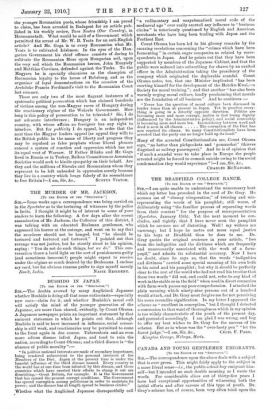CANADA AND YOUNG GENTLEMEN EMIGRANTS.
[TO THE EDITOR OP THE "SPECTATOR."] SIR,—The correspondence upon the above deals with a subject that is ever green. This might fairly apply to the subject in a more literal sense—i.e., the public-school-boy emigrant him- self—but I intended no such double meaning as I wrote the words. For considerable slices out of thirty-five years I have had exceptional opportunities of witnessing both the initial efforts and after careers of this type of youth. Dr. Gray's scheme has, of course, been very often tried upon the
same lines by admirable people. But it is not regarded with favour by intelligent Englishmen of the same social class who have long experience of Canadian rural life East or West. The sheltering of a young man under rather artificial social and economic conditions from the local life and atmosphere, when both are as vital objects of speedy acquisi- tion for him as mere chopping and ploughing, is a dubious advantage. We all (experienced ones) know only too well that a company of more or less green young Englishmen of this class, isolated together in a rural community of Colonials or Americans, react unfavourably upon one another. I do not mean morally, though heaven knows this has happened often enough. But their development towards the role of an adaptable and successful settler is checked. The unconsciously (perhaps) supercilious, and occasionally even stronger, attitude towards the natives of such lads is apt to be maintained and mutually encouraged. There is no doubt whatever that the family life of a decent household and of a well-run practical farm, worked for a living by the owner, is the best training for a youth destined himself to run the same sort of machine afterwards. He cannot help being constantly in touch with the heart and mind of the farm, so to speak, as well as the mere farm- labour. He is also learning to understand the ways and the points of view of the people with whom presumably he has got to spend his life. Then the expense is infinitely less, as the general custom is to reckon an inexperienced young man as worth his keep. This widespread standard causes practi- cally all the community in Canada to exclaim with much persistency—and the ordinary Canadian loves to rub in this sort of thing—against taking board-money and working the payee at the same time. And they never fail in season and out of season to try to make young fellows discontented on this account.
It would be incredible to people in this country how strongly they feel about this. The terms of board for a visitor in a decent Ontario or North-West farmhouse are about 3 dollars a week. In a higher-class establish- ment, where an English gentleman or such-like and his wife keep a more elaborate style, the rate has always been from 20 to 25 dollars a month, or £50 to £60 a year, for a paying guest. For living is very cheap on a ranch. At the Agri- cultural College at Guelph, I think a working student can almost pay his whole expenses, education, and board. The difficulty of selecting the farmers who will treat a boy well, and have good accommodation, from those of another sort seems very great in distant England. The carelessness of parents in shipping young boys from school practically as Government immigrants to be dumped like a carter's son or a Barnardo boy (though they are looked after) is simply criminal. But to people familiar with Canada there is, of course, no difficulty at all, and the question is not relevant to the one raised here.
One thing the English public persist in ignoring,—namely, that the Canadian of the higher classes practically never has gone farming, and never does. A liberally educated Canadian despises it utterly as a career, and leaves it wholly to the farming class (whose sons get out of it very freely, however) and to immigrants. I am not defending his point of view, though I could set out all his reasons, but merely note it as an ordinary truism of Canadian life. The English public-school boy therefore has to do with a different class of Canadian, with rare exceptions, from that he would meet if be were in a bank or a profession, which complicates matters and causes misunderstanding over here. The American immigrant farmers into the North-West are, of course, of the same type as the Canadian farmer.
As a matter of fact., most of my experienced friends, together with myself, hold that a year on a respectable Ontario farm, working for board, is the best preliminary training. They arc extremely good all-round farmers on-a compact scale, and almost everything is practised there. Of course the change is consideraMe from an English rectory, but there is nothing resembling " roughing it." I have known numbers of these men and their farms well, and a lad who flinched from such a standard would be utterly unfitted for colonising, and had better return home at once. A year thus spent, or even two, if spent properly, is simply in- valuable. Any one in the North-West is only too glad to take oil a lad who has thus graduated at good wages, and
Ontario is of course on the direct route to the North-West.
P.S.—I might add that I know Canada from Halifax to Victoria.







































 Previous page
Previous page